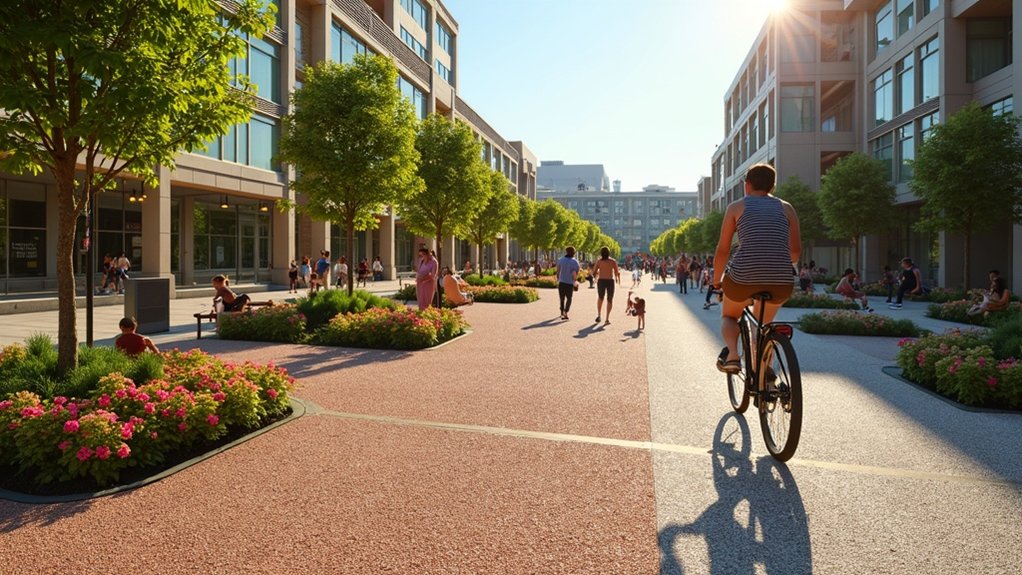Resin-bound gravel stands out as a top choice for public spaces across the UK. Built to last 20-30 years with minimal fuss, it’s as tough as old boots and keeps its looks far longer than traditional surfaces. The non-slip finish and seamless surface mean fewer trips and falls – particularly handy for busy town squares and school playgrounds.
What’s more, it’s brilliant at handling our British weather. The surface lets 95% of rainwater drain straight through, helping prevent those annoying puddles and flooding we’re all too familiar with. Made partly from recycled materials, it’s environmentally sound and comes in plenty of colours to match any setting, from historic city centres to modern shopping precincts.
Key Takeaways
Resin-bound gravel stands out as a brilliant choice for public spaces across the UK:
- Built to last 20-30 years with little upkeep, it handles heavy foot traffic brilliantly – perfect for busy town centres and shopping areas.
- The smooth, seamless surface means no loose stones or uneven patches to trip over. It’s particularly good in the wet British weather, offering solid grip when other surfaces get slippery.
- Unlike tarmac or concrete, it lets rainwater drain straight through, helping prevent puddles and surface flooding – especially useful during our rainy seasons.
- It’s a green option too. Most suppliers use recycled materials, and it needs less energy to install than traditional paving. Think of it as future-proofing our public spaces.
- You can match it to nearly any setting – from modern city squares to historic town centres – with a range of colours and finishes that complement local architecture.
Durability and Long-Term Maintenance Benefits

Resin-bound gravel offers exceptional durability and minimal maintenance, making it perfect for public spaces across the UK.
With a typical lifespan of 20-30 years, it outlasts traditional loose gravel and often surpasses both asphalt and concrete. Think of it as a ‘fit and forget’ solution – once installed, it requires remarkably little attention.
The practical benefits are clear: no regular resurfacing, no scattered stones to sweep up, and no persistent weed problems. A simple power wash now and then keeps it looking fresh. Its water permeability allows for effective rainwater management, preventing flooding in public areas. Additionally, its resilient surfaces are designed to withstand heavy foot traffic, making it an ideal choice for bustling environments.
This resilience proves particularly valuable in Britain’s variable weather, from summer heat to winter frost, making it a smart choice for busy car parks, driveways and public pathways.
Its long-term reliability and low upkeep needs translate to significant cost savings over time, especially when compared to traditional surfacing options that need frequent repairs or replacement.
Enhancing Safety and Accessibility for All
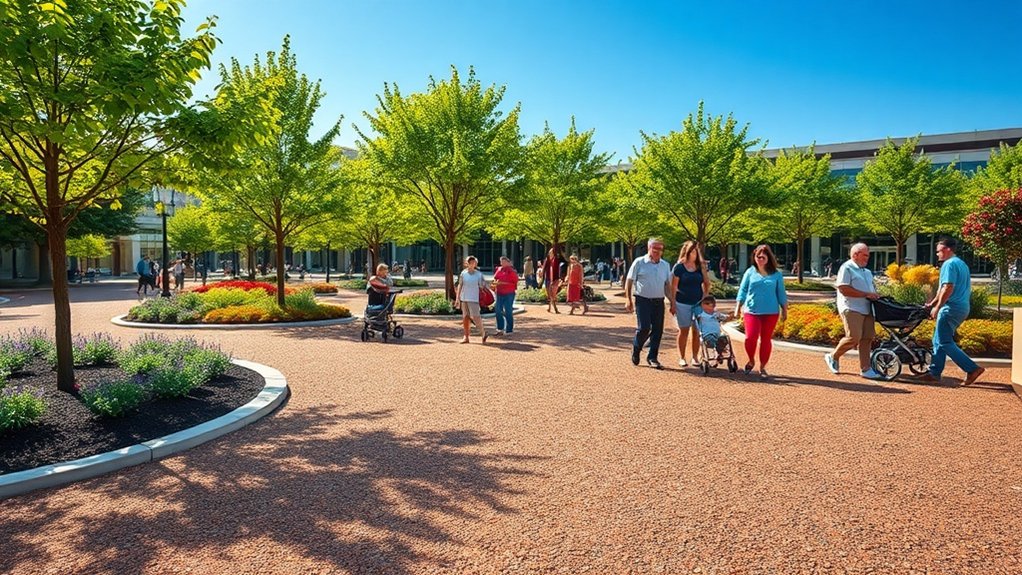
Resin-bound gravel offers outstanding safety and accessibility benefits for everyone. The surface provides excellent grip, even in wet British weather, which makes it particularly safe for children’s play areas and public footpaths.
Its smooth, joint-free finish removes trip hazards – a crucial feature for both elderly people and parents with pushchairs. The material meets UK accessibility requirements, creating a firm, stable surface that’s ideal for wheelchair users and those with mobility scooters. Additionally, it has a non-slip surface that significantly reduces slip and trip hazards. Its durability ensures that the surface remains intact despite constant foot traffic, enhancing safety for all users.
Think of a typical bumpy gravel path versus this smooth alternative – the difference is remarkable. The surface stays clean and clear of loose stones, which means safer daily use in busy areas like school grounds and community centres.
The low-maintenance nature of resin-bound gravel means fewer disruptions for repairs, keeping these spaces consistently safe and accessible year-round.
Managing Flooding and Promoting Permeability
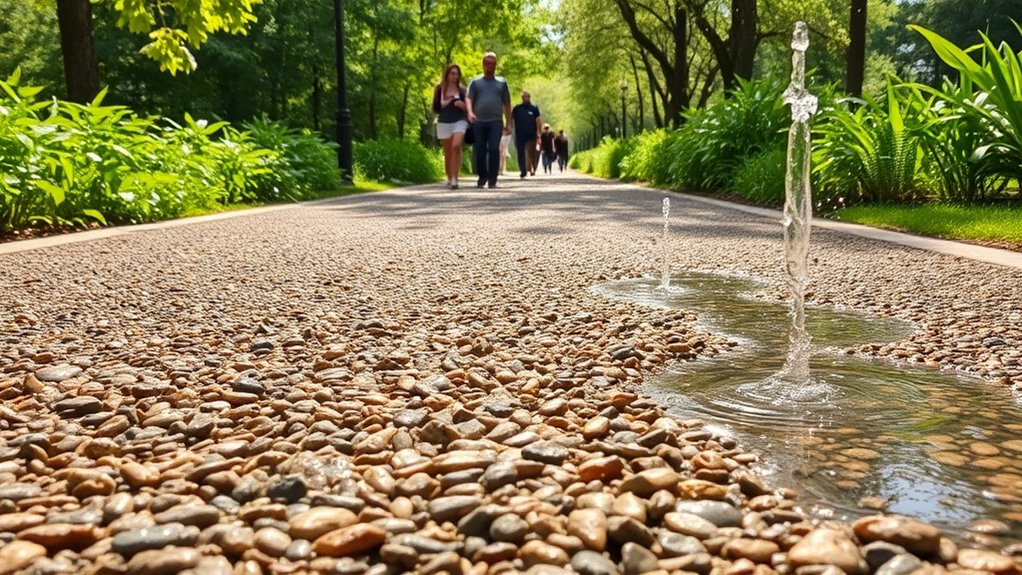
Urban areas across the UK increasingly struggle with flooding and stormwater control, making resin-bound gravel a practical choice for driveways and paths. The surface allows up to 95% of rainwater to drain through naturally, much like a garden lawn would. This significant reduction in surface water means less flooding during heavy downpours, taking pressure off local drainage networks. Additionally, this permeability helps prevent waterlogging and flooding, functioning as a natural filter similar to garden soil. Moreover, these surfaces effectively support natural water cycles, contributing to groundwater recharge and improving local water quality.
| Benefit | Impact on Flood Management |
|---|---|
| High permeability | Up to 95% water infiltration |
| Reduced surface runoff | More than 50% decrease |
| Natural groundwater recharge | Supports hydrological balance |
The system works particularly well in areas prone to flooding, such as coastal towns or riverside developments, where traditional paving often contributes to water build-up. By letting water filter through naturally, resin-bound surfaces help maintain the ground’s natural water cycle, similar to undeveloped land.
Environmental Sustainability and Eco-Friendliness
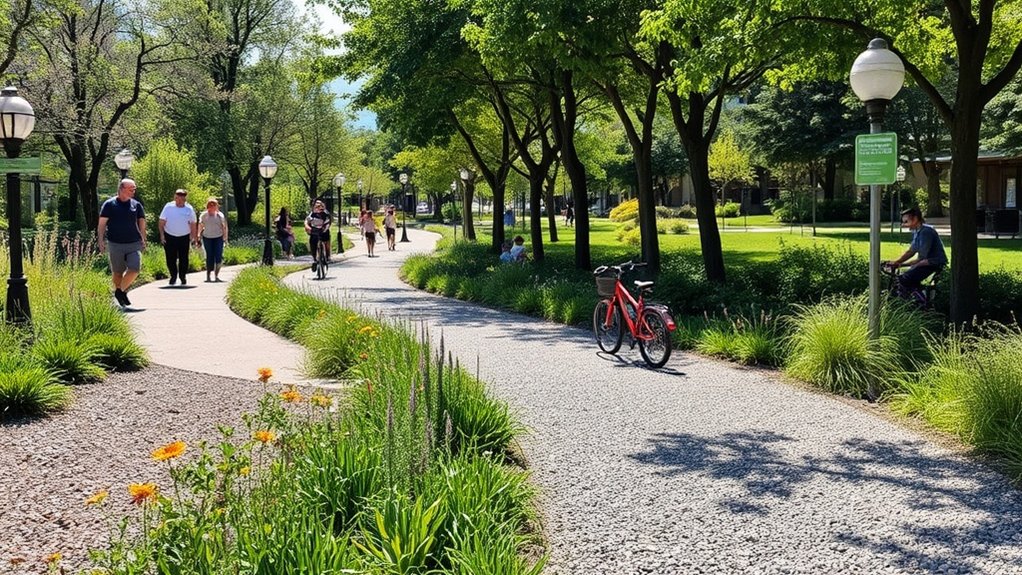
Resin-bound gravel offers outstanding green credentials for public space paving in the UK. The installation process uses far less energy than concrete laying, requiring minimal heavy machinery and reducing carbon output.
You can boost its eco-friendly nature by choosing recycled materials and local suppliers for the aggregate mix. These surfaces last for years with little maintenance, cutting down on waste and replacement costs.
What’s particularly clever about resin-bound surfaces is their natural drainage – rainwater seeps straight through rather than forming puddles or overwhelming storm drains, much like natural ground would.
The lighter-coloured stones help keep urban areas cooler in summer by bouncing back sunlight, rather than absorbing heat like tarmac does.
For councils and developers looking to create sustainable public spaces, from car parks to town squares, resin-bound gravel ticks all the environmental boxes whilst delivering a practical, long-lasting surface.
Aesthetic Appeal and Urban Integration
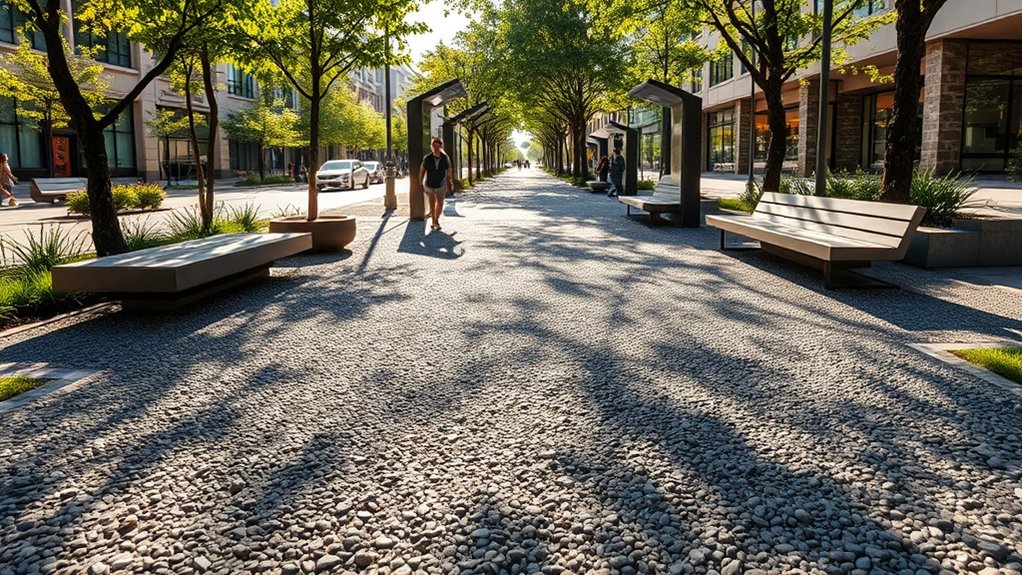
Aesthetic Appeal and Urban Integration
Resin-bound gravel fits perfectly into British urban settings, boosting both looks and practicality. The material works brilliantly with existing architecture and landscaping to create cohesive designs.
- Versatile Customisation: The range of colours and finishes means it works equally well outside Victorian townhouses or new-build offices in the city centre.
- Smooth Visual Integration: Its seamless surface creates a tidy, professional finish that enhances everything from high street shopfronts to council buildings.
- Natural Appearance: With its subtle, earth-toned finish, resin-bound gravel makes public spaces like town squares and community gardens feel more welcoming and natural.
Frequently Asked Questions
How Long Does Installation of Resin-Bound Gravel Typically Take?
Installation of resin-bound gravel typically takes 3-4 days from start to finish, including ground preparation and curing. Whilst you can walk on the surface after 6-8 hours, it’s best to wait 24-48 hours before driving on it – about the same time it takes for paint to properly dry in your home. The process is rather straightforward, though weather conditions can affect timing, particularly in typical British weather.
Can Resin-Bound Gravel Be Repaired if Damaged?
Resin-bound gravel can indeed be repaired if damaged. Small cracks and chips are sorted with a simple repair kit, whilst larger damaged areas might need a professional touch. Regular brushing and occasional pressure washing keep the surface in top nick, helping you spot and sort any issues before they worsen. Think of it like maintaining your car – catch problems early, and you’ll avoid bigger headaches down the line.
What Is the Cost Comparison With Other Paving Options?
Resin-bound gravel costs more upfront compared to traditional paving, but proves better value long-term. Whilst a basic block paving might cost £30-40 per square metre, resin-bound surfaces typically start at £60-80. However, the reduced maintenance needs (no weeding or frequent repairs) and exceptional durability (15-25 years) offset the higher initial cost. Unlike loose gravel or concrete, which often need replacing or fixing every few years, resin-bound surfaces maintain their look and function with minimal upkeep.
Is Resin-Bound Gravel Suitable for DIY Installation?
Resin-bound gravel can work as a DIY project, but it’s not a simple weekend job. You’ll need to get the mixing ratios spot-on (much like baking a cake) and prepare your surface properly. Think of it as laying a new carpet – the prep work is crucial. A rushed or poorly mixed installation will crack and look shabby within months. Best suited for confident DIYers who have tackled similar outdoor projects before.
How Does Resin-Bound Gravel Perform in Extreme Temperatures?
Resin-bound gravel reacts notably to Britain’s varied weather conditions. In summer heat, the surface may expand slightly – much like railway tracks on a hot day. During winter freezes, the material can become more brittle, potentially causing cracks if not properly installed. Think of it like a chocolate bar: flexible when warm, brittle when cold. Quality installation with the right mix and proper drainage is crucial for lasting performance across our seasonal extremes.
Conclusion
Resin-bound gravel offers the perfect mix of practicality and style for public spaces across the UK. It’s tough enough to handle heavy foot traffic in town centres and shopping precincts whilst requiring minimal upkeep. The non-slip surface makes it particularly safe for wheelchair users and pushchairs, even in wet weather. Its porous nature helps prevent puddles and flooding, which is crucial given Britain’s rainy climate. The clean, smart finish suits both modern developments and historic settings, from village squares to city parks. Plus, it’s UV-stable, so it won’t fade or yellow in what little sunshine we get.
